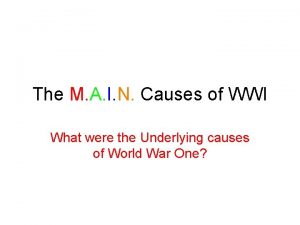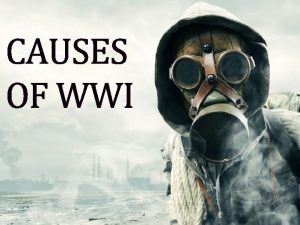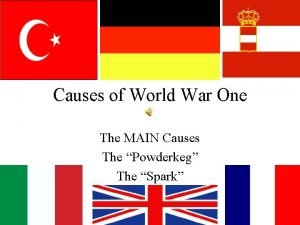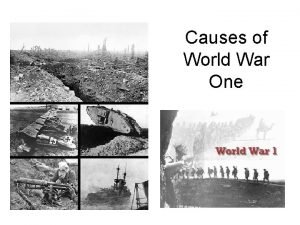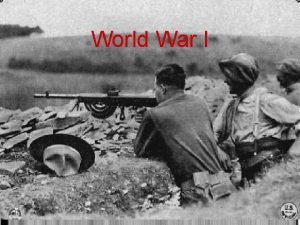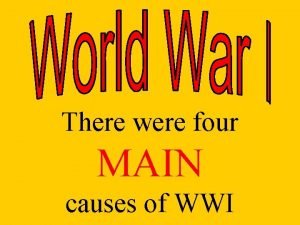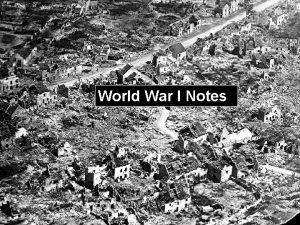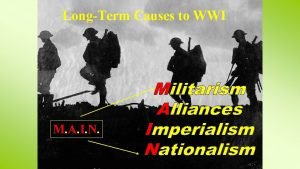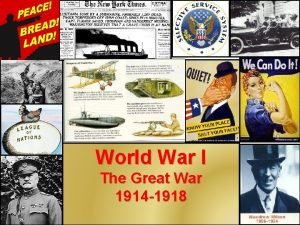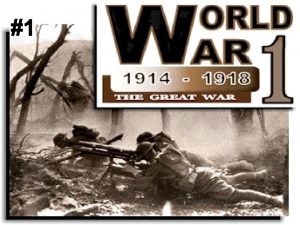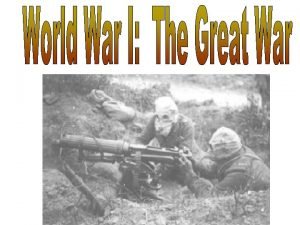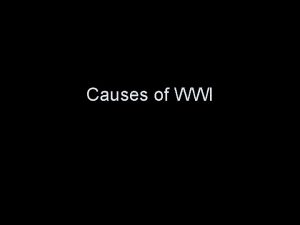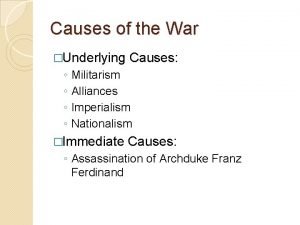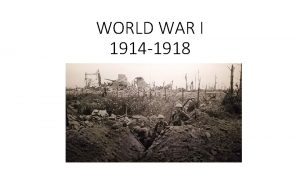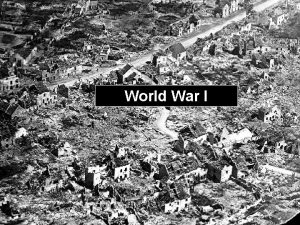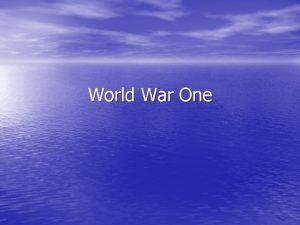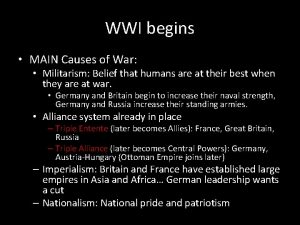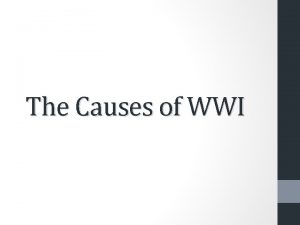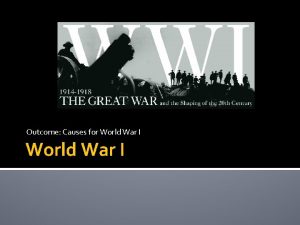World War I Underlying Causes of WWI Militarism













- Slides: 13

World War I

Underlying Causes of WWI Militarism n Alliance System n Imperialism n Nationalism n

Alliances n n Fear of war led many nations to seek out friends and make alliances. These alliances often included promises to fight for other nations under attack. The Triple Alliance included Germany, Austria-Hungary, and Italy. The Triple Entente included Britain, France, and Russia.

Militarism n n n Militarism is the belief that the use of force was an acceptable way to decide political problems. Many nations had forgotten the horrors of war. All the Great Powers except for Great Britain had been building large armies and stockpiling weapons. Many generals developed war plans such as Germany’s Schlieffen Plan. The Schlieffen Plan was designed to prevent fighting a war on two fronts. They would attack France first and then turn to Russia.

Imperialism n n Many European nations were competing for new colonies, new markets, and new sources of raw materials. Most of Africa, India, parts of the Middle East, and China were under European control.

Nationalism n n n The spirit of nationalism influenced the Great Powers as well as many minor nationalities such as the Serbs. The Great Powers wanted to make their nation “the best!” Many of the minority groups wanted their independence.

The Immediate Cause of World War I The Archduke Francis Ferdinand, heir to the throne of Austria. Hungary, was murdered by a Serbian nationalist on June 28, 1914.

Steps Leading to War Austria declared war on Serbia July 28, 1914, after being given “ a blank check” of support by Germany. n Russia mobilized its troops, and Germany in return declared war on Russia and France. n Germany invaded Belgium, a neutral country, on Aug. 3, 1914. This forced Britain to declare war on Germany. n

A War of Many Fronts n n n Germany marched through Belgium but they were stopped in France by the Allies. The Russians moved to the German borders and fighting began. Battle zones also developed in Italy, Asia, and Africa.

New Weapons n n Many new weapons were used during World War I. These weapons dramatically changed the way war was fought. Some of these new weapons included the machine gun, tank, flame throwers, and poison gas. Towards the end of the war planes were used to drop bombs.

End of the War n n n n Several events brought about the end of the war. Russia dropped out of the war because of a revolution. The people were suffering and out of supplies. The U. S. entered the war on the side of the Allies. Both sides began to run out of supplies and troops. On Nov. 9, 1918 , Kaiser William II abdicated the throne. Germany became a republic. An Armistice was signed on Nov. 11, 1918. This ended the fighting.

The Treaty of Versailles n n n n The Treaty of Versailles was very harsh. Germany lost a great deal of land most of its colonies. France gained important German territories such as Alsace-Lorraine and the Saar. Part of German territory became the new nation of Poland. The Austria-Hungarian empire was broken up. The Germans had to accept a war guilt clause. The Germans also had to pay over $31 billion dollars in war reparations. The treaty also included a plan for The League of Nations.

The League of Nations was part of Wilson’s Fourteen Points. n This league was designed to help nations work out problems before wars could start. n The United States never signed the Treaty of Versailles and did not participate in the League of Nations. n
 Cause of world war 2
Cause of world war 2 Militarism def
Militarism def Underlying causes of ww1
Underlying causes of ww1 What are the underlying causes of ww1
What are the underlying causes of ww1 Kaiser wilhelm ii deformity
Kaiser wilhelm ii deformity Militarism world history definition
Militarism world history definition Causes of world war 1
Causes of world war 1 Simulateries
Simulateries Mania world war 1
Mania world war 1 Main long term & immediate causes of wwi
Main long term & immediate causes of wwi 4 causes of ww1
4 causes of ww1 Major causes of world war 1
Major causes of world war 1 What were the 4 main causes of wwi
What were the 4 main causes of wwi Mania acronym for causes of wwi
Mania acronym for causes of wwi

